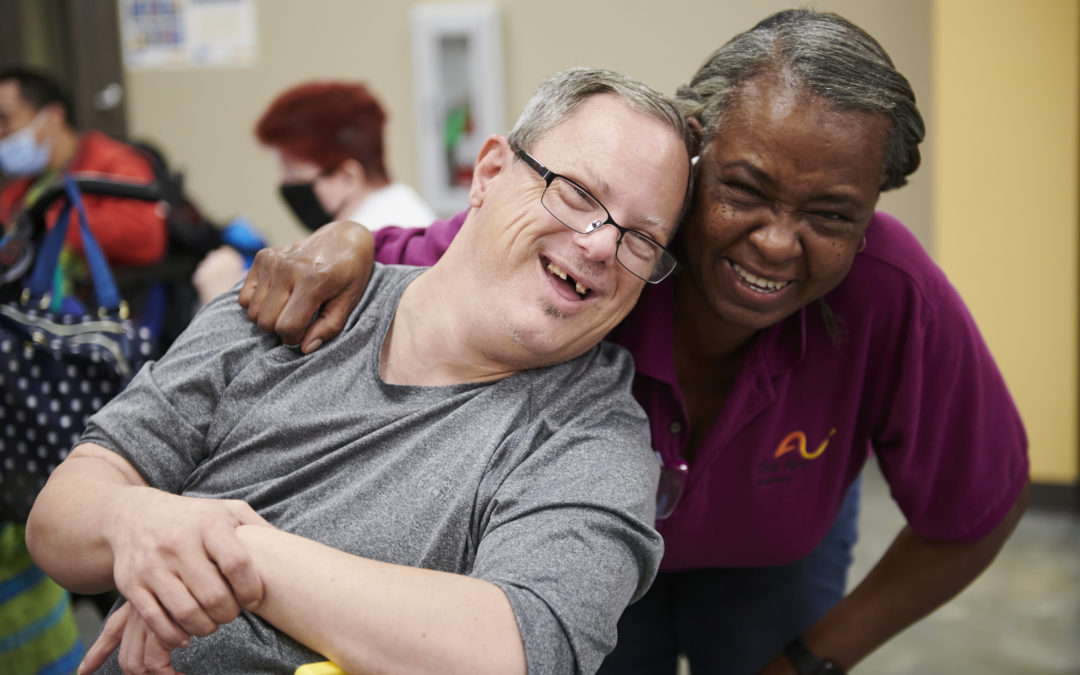What is a Direct Support Professional?
Put quite simply, the best direct support professionals give the gifts of self-sufficiency and independence to people who really need help gaining them. Often referred to as DSPs, direct support professionals are far more than caregivers, aides or sitters. They’re trustworthy, dedicated people who want to help individuals with intellectual or developmental disabilities claim the quality of life that they deserve and are meant to have.
The People DSPs Work With
Direct support professionals work with people who have intellectual or developmental disabilities that keep them on the brink of living a fully independent life. For some, their differences and conditions have been a part of their lives since birth. For others, trauma, medical conditions or degenerative diseases have changed their lives. For all, the differences often impact their physical, mental and emotional capabilities. They need help learning how to manage their everyday lives, and that’s why direct support professionals are so important.
What Do Direct Support Professionals Do?
Each direct support professional’s assignment begins a unique partnership. The central focus is not to do tasks for the person they’re paired with but to teach and support them in learning how to do tasks that are important to them for themselves. The goal is to help each person realize a level of independence that they might otherwise never achieve.
Some DSPs are dedicated to providing in-home services, while others work in group home settings. Many of the activities that DSPs are involved with are standard everyday tasks but can differ considerably depending on the setting and a client’s individual skill levels, capabilities and personality. Tailoring support can help a client grow and become more confident yet keep them safe as they work on any number of tasks that can boost their independence. A client’s personal care plan may contain any number of elements.
• DSPs may help clients with everyday tasks like eating, getting dressed or completing personal hygiene.
Since a DSP’s goal is to help a person become more self-sufficient, a DSP may help teach a person how to use utensils more effectively rather than simply feed them, for example. Or, the DSP may help their client figure out what would be appropriate to wear to suit that day’s weather and how to don it properly rather than simply dressing them.
• DSPs may assist clients with higher-level tasks like shopping and paying for groceries or preparing simple meals.
Rather than just purchasing and delivering food to a client, a DSP can take their client shopping and teach them how to make good nutritional choices, how to pay for their purchases, and maybe even how to make a few simple dishes or snacks for example.
• Some clients may need help with keeping their home or quarters clean and tidy and remembering to do tasks.
Like washing dishes, doing laundry, putting items away or taking out the trash, for example. A DSP isn’t there to clean the house for their client but to ensure things are cleaned and put away. Sometimes, it’s as simple as helping a client who’s unable to bend a certain way, reach in a particular direction, or pick up something awkward or heavy.
• Many clients benefit from help and practice with social skills.
Things many of us take for granted like greeting people appropriately, being able to respond in a conversation, playing a simple game or asking important questions politely.
• Clients may need help with money-management skills.
Like developing and sticking to a budget, ensuring bills get paid on time or maintaining online accounts.
• DSPs may accompany clients to activities or professional appointments.
With doctors, dentists or specialists, for example. Being an active part of the community is vital to people with intellectual or developmental disabilities, and having a support partner can give them the freedom they need to be able to volunteer with an organization, meet with friends or peers, take a class or even get a job.
• DSPs often help to manage medications and ensure that they’re administered properly and on time.
Access to medication may need to be limited and documented.
• DSPs document activities, milestones and other data to maintain a client history and track incremental progress.
Accurate recordkeeping is vital to keeping client information current and accurate.
• DSPs ensure that their clients remain safe from harm and that they have a healthy environment free of hazards.
Many individuals with disabilities fail to recognize dangers and may not have the gross or fine motor skills needed to respond quickly.
For DSPs, the advantage is that services are often needed during both the daytime and evenings, so hours offer some flexibility and variety. Likewise, different settings—individual home-based or community group home-focused—offer a range of social interactions.
What Makes a Great DSP?
Being a direct support professional is a position of responsibility. DSPs not only are entrusted with the welfare and progress of their clients but also serve as role models who teach and guide them through tasks that can be challenging. Learning can take longer as tasks must be broken into small achievable steps. Skills may need more repetitions for mastery, and communication may be more challenging. Certain qualities are vital to the career.
- Perceptiveness—DSPs need to be observant and able to notice when a task is stressing a client, for example, or a client isn’t feeling well. DSPs are often the first to notice that something isn’t right or that a change in routine or environment is needed.
- Patience—The clients that DSPs serve may need more time to perform tasks that involve either physical or cognitive abilities. Clients may need many repetitions over many sessions to remember or master a skill.
- Positivity—DSPs need to be encouraging, be willing to reward the try and always try to end an interaction on a positive note.
- Integrity—Clients with intellectual and developmental disabilities are vulnerable in many ways, so DSPs must be dependable, punctual and trustworthy.
- Poise—When unexpected events occur, DSPs need to be consistently able to remain calm and act appropriately in accordance with training and policy.
- Rapport—DSPs need to like interacting with people—their clients and their fellow team professionals.
The very best DSPs balance compassion and empathy with the commitment to help someone claim their own independent space within their community.
Serving as a direct support professional is a challenging career, but it’s also a highly rewarding one. Nothing can substitute for the smile of triumph when a client finally masters a skill and does something completely for themselves—and you know that you were a part of that.
If you think that a career as a DSP might be for you, The Arc of Acadiana is always looking for people who are passionate about helping other people. Reach out. You can complete your online application today.

